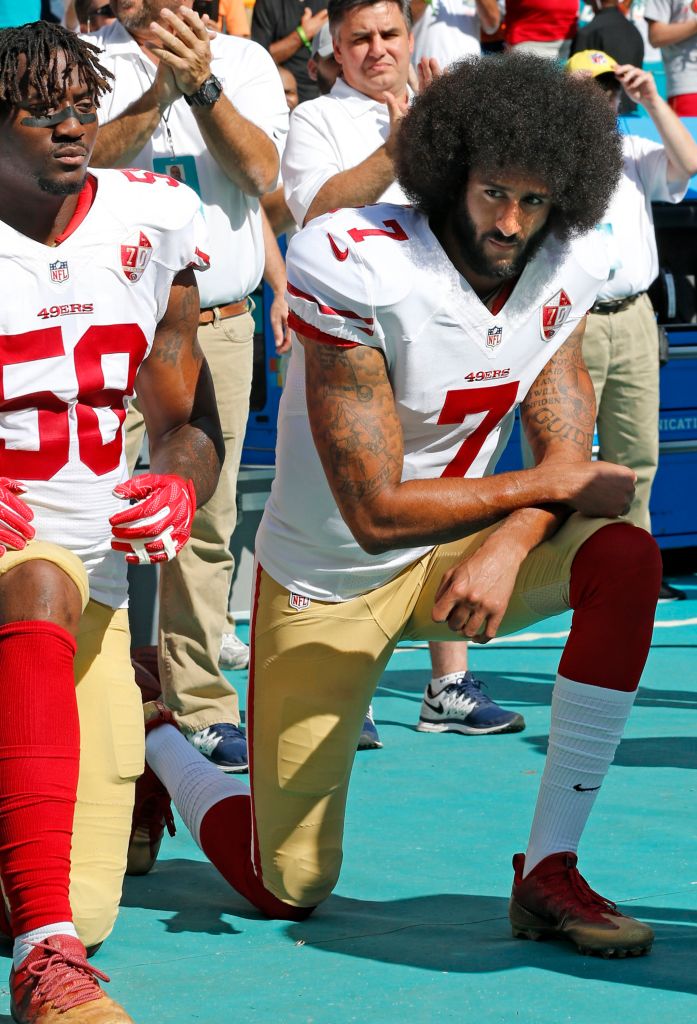
Source: Miami Herald / Getty
The NFL season has officially started and Colin Kaepernick still doesn’t have a job. Many have protested at the NFL headquarters in New York City, demanding that Colin not be punished for taking a nonviolent stand (or knee) and calling out the racist treatment of Black people in America, but the powers that be have not budged.
Over the weekend, athletes ranging from Michael Jordan to LeBron James took a stance against President Donald Trump’s racially charged statements against professional athletes. The NBA isn’t the only league that took action. NFL players across the nation also decided to #TakeTheKnee, or link arms, in solidarity to the oppressive rants of the 45th leader of the United States. Sadly, the conversation has now changed its focused to money and the pledge of allegiance, begging the obvious question: What about Colin?
To be clear, it’s not like Kap wouldn’t have been picked up by a team under normal circumstances. As a quarterback for the 49ers last season, he had 16 touchdowns and just four interceptions, making him a good addition to any team’s roster. But because of what owners called “unwanted attention” to the league, he’s been blackballed.
Right before the start of the season, several groups circulated a petition and vowed to boycott the NFL this season if he wasn’t signed. But as I scroll through my social media timelines, it is evident that some of us didn’t follow through. It is time to stick together if we want anything to change in this country.
This is bigger than football. This is about moving ahead as a people and as a country. The truth of the matter is that no real change ever happens without economics being involved. We saw this with the Montgomery bus boycott where African Americans refused to ride the bus for 13 months, landing a crushing blow to the Alabama Bus System’s bottom line that forced it to desegregate the buses. And we saw it with South Africa’s anti-Apartheid movement, which asked other countries to withdraw their economic support of the nation until it ended the practice. It also worked.
If we purely look at the numbers, the NFL, is made up of 70% African-American players. But there are zero Blacks serving as majority stakeholders or team owners. Kaep’s crisis shows why ownership matters. Can you imagine if there were majority Black owners in the NFL? Or if Black millionaires and billionaires pooled their money together and started their own league?
For the record, the NFL has Black part-owners like Venus and Serena Williams of the Miami Dolphins and Pastor Kirbyjohn Caldwell of the Houston Texans. But when it comes to principle ownership in any professional sport, Michael Jordan of the Charlotte Bobcats is the only one.
The point is, there is power in numbers and we have the numbers. We must simply choose to use them. What good is a light bulb in the dark if you don’t turn on the switch? African Americans only make up 15% of the NFL viewership, but what would happen if we decided to stop supporting games, the NFL TV packages and the 37 sponsors of the NFL? If we collectively took that stance, we would signal to the world that not only do Black Lives Matter, but so do Black dollars.
According to a Nielsen study we are scheduled to spend $1.3 trillion this year. Let’s control that dollar and demand respect.
Ash Cash in a money expert who ispassionate about helping people of color align their dollars and sense. Find out more and listen to his podcasts at IAmAshCash.
















